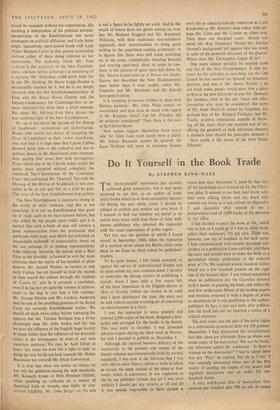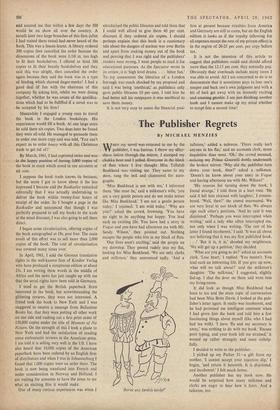Do It Yourself in the Book Trade
By STEPHEN KING-HALL THE 'do-it-yourself' movement has recently achieved great popularity, but it had never occurred to me that, as an author of some thirty books which have been reasonably success- ful during the past thirty years. I should be obliged to publish and market my own book if I wanted to find out whether my belief in its merits were more valid than those of three well- known publishers who returned the typescript with the usual expressions of polite regret.
Yet this was the position in which I found myself in September, 1960, when the typescript of a satirical novel about the Berlin crisis came back to me from its third ordeal by publishers' readers.
To be quite honest, I felt rather annoyed, so against the advice of well-informed friends and to some extent my own common sense, I decided to undertake the daring venture of publishing it myself. Since I have only a few copies left of the third impression of the English edition of Men of Destiny (which are certain to be sold) and I have distributed the type, the story can be told without anyone accusing me of concealing an advertisement in a story.
I sent the typescript to some printers and ordered 2,000 copies of the book, designed a dust- jacket and arranged for the books to be bound. This was early in October. 1 was promised advance copies during the third week in Novem- ber and I decided to publish on December 5.
Although the interval between delivery of the manuscript to the printers and receipt of the bound volumes was miraculously,brief by normal standards, I was now in the dilemma that I was only able to allow literary editors a week in which to review the book instead of the three or four weeks which is customary. It was explained to me by my publisher friends that (a) it was most unlikely I should get any reviews at all and (b) it was almost impossible to have chosen a worse date than December 5, since by that time all the bookshops were stocked up for the Christ- mas sales. It seemed to me they must know what they were talking about and my heart sank towards my boots as a van arrived on December 5 and deposited what seemed to me a mountainous load of 2,000 books at the entrance to my office.
I had decided to price the book at 18s., which was as low as I could go if I was to allow book- sellers their customary 331 per cent. There was, however, one ray of sunshine in the dark scene. I had communicated with several thousand sub- scribers of a publication I own and edit, told them the story and invited them to order the boa as a speculation before publication at the reduced price of 15s. We received several hundred orders which put a few hundred pounds on the right side of the balance sheet. I was indeed astonished when on publication day the Guardian devoted its first leader to praising the book and within the next few weeks some fifteen of the leading papers and weeklies reviewed it with a degree of praise as unanimous as it was gratifying to the author- publisher. In fact, a year and more after publica- tion the book has not yet received a notice of a critical character.
The next event was the sale of the serial rights to a well-known provincial daily for 250 guineas. Meanwhile I had discovered the extraordinary fact that there are wholesale firms to whom one sends copies of the dust-jacket. 'But not the book,' my informant added. He continued: 'Is there a woman on the dust-jacket?' I had to admit there was not. 'Pity!' he replied, 'but do as I say.' I was certainly astounded when one of the first results of sending out copies of my severe and dignified dust-jacket was an order for one hundred books.
A very well-known firm of booksellers then ordered one hundred plus 500 on sale or return and assured me that within a few days the 500 would be on show all over the country. A month later two large branches of this firm (after I had visited them twice) had never heard of the book. This was a lesson learnt. A library ordered 300 copies then cancelled the order because the dimensions of the book were 3 /10 in. too high to fit their bookshelves. I offered to bind 300 copies to fit their beastly bookshelves and they said this was alright, then cancelled the order again because they said the book was in a type of binding which showed finger-marks! I had a good deal of fun with the chairman of this company by asking him, whilst we were dining together, whether he was aware of the qualifica- tions which had to be fulfilled if a novel was to be accepted by his firm!
Meanwhile I engaged a young man to travel the book in the London bookshops. His experiences would fill a book. At one large store he sold them six copies. Two days later he found they were all sold. He managed to persuade them to order one more copy and was told, `You can't expect us to order heavy with all this Christmas trash to get rid of !'
By March, 1961, I had reprinted twice and was in the happy position of having 3,000 copies of the book in stock which stood in our accounts at nil cost.
I suppose the book trade knows its business, but the more I got to know about it the less impressed I became and the Bookseller remarked editorially that I was actually undertaking to deliver the book within twenty-four hours of receipt of the order. So I bought a page in the Bookseller and announced that though I was perfectly prepared to sell my books to the trade at the usual discount, I was also going to sell them direct.
I began some circularisation, offering copies of the book autographed at 18s. post free. The main result of this effort was to sell more than 2,000 copies of the book. The cost of circularisation was covered many times over.
In April, 1961, I sold the German translation rights to the well-known firm of Kindler Verlag who have produced a sumptuous edition at about 25s. I am writing these words in the middle of Africa and the news has just caught up with me that the serial rights have been sold in Germany.
I tries to get the British paperback firms interested in the book, but notwithstanding the glittering reviews, they were not interested. A friend took the book to New York and I was staggered to receive a message from Ballantine Books Inc. that they were putting all other work on one side and rushing out a first print order of 150,000 copies under the title of Moment of No Return. On the strength of this I took a plane to New York and had the satisfaction of reading some enthusiastic reviews in the American press. I am told it is selling very well in the US. I have also heard that 10,000 copies of the American paperback have been ordered by an English firm of distributors and when I was in Johannesburg I found that 1,000 copies were on order there. The book is now being translated into French and under consideration in Norway and Holland. I am waiting for someone to have the sense to see what an exciting film it would make.
One of many curious experiences was when I circularised the public libraries and told them that I could well afford to give them 40 per cent. discount if they ordered six copies. I should perhaps explain that this book is a cautionary tale about the dangers of nuclear war over Berlin and apart from making money out of the book and proving that I was right and the publishers' readers were wrong, I want people to read it for educational purposes. As the Spectator wrote in its review, it is 'high level drama . . . bitter fun.' To my amazement the librarian of a London borough was much shocked by my proposal and said I was being 'unethical,' as publishers only gave public libraries 10 per cent. 1 told him he had better tell his ratepayers it was unethical to save them money.
It is not very easy to assess the financial posi- tion at present because royalties from America and Germany are still to come, but on the English edition it looks as if the royalty (allowing for all expenses except the rent of my private office) is in the region of 20-25 per cent. per copy before tax.
It is not the intention of this article to suggest that publishers could and should afford more than the 12-15 per cent. they normally pay. Obviously their overheads include many items I was able to avoid. All I am concerned to do is to demonstrate that it sometimes pays to lose one's temper and back one's own judgment and with a bit of luck get away with an intensely exciting and amusing gamble. I am just finishing another book and I cannot make up my mind whether to tempt fate a second time!



































 Previous page
Previous page